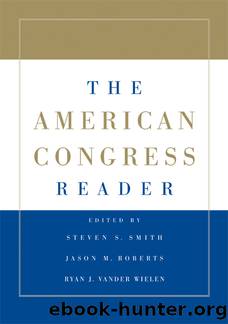The American Congress Reader by Steven S. Smith & Jason M. Roberts & Ryan J. Vander Wielen

Author:Steven S. Smith & Jason M. Roberts & Ryan J. Vander Wielen [Smith, Steven S.]
Language: eng
Format: azw3, mobi, epub
Publisher: Cambridge University Press
Published: 2008-12-14T16:00:00+00:00
Committees and jurisdictions
The organization of the workload through a specialized committee structure is one of the most important elements of how Congress works, and it has been one of the most often studied aspects of that institution. These jurisdictions are neither automatically enforced nor straightforward to determine. In fact, turf battles have long been a part of the congressional process. These battles are not simple personality conflicts among ambitious politicians, but they have important policy consequences as well.
While cable television regulation had a foundation in the Energy and Commerce Committee, it was eventually referred to the Judiciary Committee as antitrust legislation. A staff member from the House Judiciary Committee explained this referral by emphasizing the power of the chair, not previous jurisdictional control. “Our chair wanted that bill [Cable Television Regulation Bill of 1992] because it was an important issue. Since he is powerful and intimidating, he usually gets what he wants.” President Clinton's health-care-reform effort involved turf wars between the House Ways and Means Committee, the House Energy and Commerce Committee, and the House Education and Labor Committee, with similar conflicts in the Senate. Battles for jurisdictional control have long been an important element of the legislative process.
Claims of specialized information and established expertise play an important role in the referral of legislation to committees. This rela-tionship was confirmed by a staff member from the Senate Labor and Human Resources Committee, who reported that the more specialized information the committee possessed on new issues, the greater their chances to claim future jurisdictions. For example, when asked about the new health reform, the staff member responded, “we are the experts on this issue, our chair has been pushing it for years, we have to get the referral.” Shortly after the Clinton health-care-reform package was released, the House Education and Labor Committee released a report detailing their claims to relevant portions of the plan. In addition to the report, the committee also announced plans to hold investigative hearings, or as one staff member said, to “flex their muscles.” A staff member for a House committee chair commented that hearings are often useful to gauge the positions of other committees. “The hearings are basically for show, but they allow us to flex our muscles, and provide a record of our position. Then we can find out who is with us, and who is against us.” After such position taking, the committee usually receives communication from other committees expressing their concerns and interests in the problem. This record allows the committee to know their competition and claims to the issue any other committees may have. It also provides a useful argument for future discussions with the parliamentarian over which committee should be granted jurisdiction over which legislation. Nonlegislative hearings are used to claim future legislative authority. Committee leaders and their staffs establish their records as experts in the area so that future legislation is more likely to be referred to them.
Hearings have been labeled a two-edged instrument, in that they may promote some problem or seek to remove it from public debate.
Download
The American Congress Reader by Steven S. Smith & Jason M. Roberts & Ryan J. Vander Wielen.mobi
The American Congress Reader by Steven S. Smith & Jason M. Roberts & Ryan J. Vander Wielen.epub
This site does not store any files on its server. We only index and link to content provided by other sites. Please contact the content providers to delete copyright contents if any and email us, we'll remove relevant links or contents immediately.
The Secret History by Donna Tartt(19092)
The Social Justice Warrior Handbook by Lisa De Pasquale(12191)
Thirteen Reasons Why by Jay Asher(8912)
This Is How You Lose Her by Junot Diaz(6889)
Weapons of Math Destruction by Cathy O'Neil(6281)
Zero to One by Peter Thiel(5802)
Beartown by Fredrik Backman(5756)
The Myth of the Strong Leader by Archie Brown(5509)
The Fire Next Time by James Baldwin(5447)
How Democracies Die by Steven Levitsky & Daniel Ziblatt(5219)
Promise Me, Dad by Joe Biden(5154)
Stone's Rules by Roger Stone(5088)
A Higher Loyalty: Truth, Lies, and Leadership by James Comey(4964)
100 Deadly Skills by Clint Emerson(4926)
Rise and Kill First by Ronen Bergman(4790)
Secrecy World by Jake Bernstein(4753)
The David Icke Guide to the Global Conspiracy (and how to end it) by David Icke(4720)
The Farm by Tom Rob Smith(4514)
The Doomsday Machine by Daniel Ellsberg(4490)
